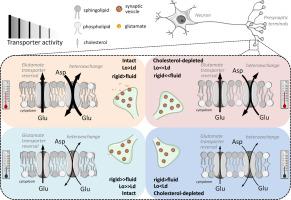当前位置:
X-MOL 学术
›
BBA Biomembr.
›
论文详情
Our official English website, www.x-mol.net, welcomes your
feedback! (Note: you will need to create a separate account there.)
Dual benefit of combined neuroprotection: Cholesterol depletion restores membrane microviscosity but not lipid order and enhances neuroprotective action of hypothermia in rat cortex nerve terminals.
Biochimica et Biophysica Acta (BBA) - Biomembranes ( IF 2.8 ) Pub Date : 2020-05-21 , DOI: 10.1016/j.bbamem.2020.183362 A Pastukhov 1 , N Krisanova 1 , K Pyrshev 2 , T Borisova 1
Biochimica et Biophysica Acta (BBA) - Biomembranes ( IF 2.8 ) Pub Date : 2020-05-21 , DOI: 10.1016/j.bbamem.2020.183362 A Pastukhov 1 , N Krisanova 1 , K Pyrshev 2 , T Borisova 1
Affiliation

|
Here, both neuroprotectants, i.e. cholesterol depletion of the plasma membrane of rat brain nerve terminals (synaptosomes) using methyl-β-cyclodextrin (MβCD) and deep/propound hypothermia, were analyzed during their combined administration and regarding additive neuroprotective effect. The extracellular synaptosomal level of L-[14C]glutamate significantly increased after treatment with MβCD in both deep and profound hypothermia. Cholesterol depletion gradually enhanced inhibiting effect of deep and profound hypothermia on glutamate uptake and "excitotoxic" transporter-mediated release of L-[14C]glutamate. A decrease in L-[14C]glutamate release via heteroexchange from nerve terminals in deep and profound hypothermia was enhanced by cholesterol deficiency that confirmed previous result. Fluorometric studies with probes NR12S and DCVJ revealed oppositely directed effects of cholesterol depletion and hypothermia on synaptosomal membrane lipid order and microviscosity showing that cholesterol depletion can normalise up to the control hypothermia-induced increase in microviscosity, but not the lipid order of the synaptosomal membrane. Dynamics of changes in exocytosis in nerve terminals, which involved membrane fusion stage, was different from transporter-dependent ones. Hypothermia did not augment effects of cholesterol depletion on exocytotic L-[14C]glutamate release and lowering cholesterol enhanced the impact of deep, but not profound hypothermia on this parameter. Therefore, dual benefit of combined neuroprotection was demonstrated. Cholesterol depletion enhanced neuroprotective effects of hypothermia intensifying inhibition of "excitotoxic" transporter-mediated glutamate release and can normalise a hypothermia-induced increase in microviscosity of the synaptosomal membrane. This feature is prospective in mitigation of side effects of therapeutic hypothermia, and also for brain conservation preserving normal physical and chemical properties of the cellular membranes.
中文翻译:

联合神经保护的双重好处:胆固醇消耗可恢复膜微粘度,但不能恢复脂质秩序,并增强大鼠皮层神经末梢体温过低的神经保护作用。
在此,对两种神经保护剂,即使用甲基-β-环糊精(MβCD)和深部/化合物低温治疗的大鼠脑神经末梢(突触体)质膜的胆固醇耗竭进行了分析,并分析了它们的联合用药效果。在深低温治疗中,MβCD治疗后L- [14C]谷氨酸的胞外突触体水平显着升高。胆固醇的消耗逐渐增强了深低温对谷氨酸摄取和“兴奋性”转运蛋白介导的L- [14C]谷氨酸释放的抑制作用。胆固醇不足证实了先前的结果,通过深部低温发生的神经末梢异种交换而导致的L- [14C]谷氨酸释放减少。用探针NR12S和DCVJ进行的荧光定量研究表明,胆固醇耗竭和体温过低对突触体膜脂质顺序和微粘度具有相反的直接作用,表明胆固醇耗竭可以归一化至对照体低温引起的微粘度增加,但不能正常化突触体膜的脂质顺序。涉及膜融合阶段的神经末梢胞吐作用变化的动力学不同于依赖转运蛋白的动力学。体温过低不会增加胆固醇消耗对胞外L- [14C]谷氨酸释放的影响,而降低胆固醇却增强了深低温对这一参数的影响,但并不深。因此,证明了联合神经保护的双重益处。胆固醇的消耗增强了体温过低的神经保护作用,从而增强了对“兴奋性”转运蛋白介导的谷氨酸盐释放的抑制作用,并且可以使体温过低引起的突触体膜微粘度增加正常化。此功能在减轻治疗性体温过低的副作用方面具有前景,对于保持细胞膜正常的物理和化学性质的脑保护也很有用。
更新日期:2020-05-21
中文翻译:

联合神经保护的双重好处:胆固醇消耗可恢复膜微粘度,但不能恢复脂质秩序,并增强大鼠皮层神经末梢体温过低的神经保护作用。
在此,对两种神经保护剂,即使用甲基-β-环糊精(MβCD)和深部/化合物低温治疗的大鼠脑神经末梢(突触体)质膜的胆固醇耗竭进行了分析,并分析了它们的联合用药效果。在深低温治疗中,MβCD治疗后L- [14C]谷氨酸的胞外突触体水平显着升高。胆固醇的消耗逐渐增强了深低温对谷氨酸摄取和“兴奋性”转运蛋白介导的L- [14C]谷氨酸释放的抑制作用。胆固醇不足证实了先前的结果,通过深部低温发生的神经末梢异种交换而导致的L- [14C]谷氨酸释放减少。用探针NR12S和DCVJ进行的荧光定量研究表明,胆固醇耗竭和体温过低对突触体膜脂质顺序和微粘度具有相反的直接作用,表明胆固醇耗竭可以归一化至对照体低温引起的微粘度增加,但不能正常化突触体膜的脂质顺序。涉及膜融合阶段的神经末梢胞吐作用变化的动力学不同于依赖转运蛋白的动力学。体温过低不会增加胆固醇消耗对胞外L- [14C]谷氨酸释放的影响,而降低胆固醇却增强了深低温对这一参数的影响,但并不深。因此,证明了联合神经保护的双重益处。胆固醇的消耗增强了体温过低的神经保护作用,从而增强了对“兴奋性”转运蛋白介导的谷氨酸盐释放的抑制作用,并且可以使体温过低引起的突触体膜微粘度增加正常化。此功能在减轻治疗性体温过低的副作用方面具有前景,对于保持细胞膜正常的物理和化学性质的脑保护也很有用。











































 京公网安备 11010802027423号
京公网安备 11010802027423号